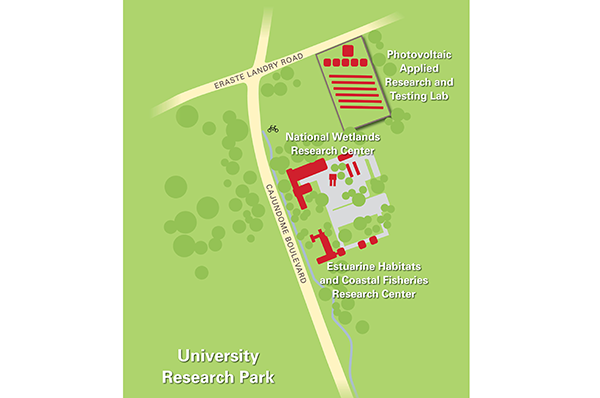The University of Louisiana at Lafayette and Louisiana Generating LLC, a subsidiary of NRG Energy, Inc., have signed an agreement for the construction and operation of a $5 million solar project on campus.
The Photovoltaic Applied Research and Testing Laboratory will be located on about five acres in the northeastern portion of University Research Park, near Eraste Landry Road.
Dr. Terry Chambers, an associate professor of mechanical engineering who is leading the project, said it will be used to evaluate emerging solar technologies. “At the same time, it’s a power generator. Essentially, we’re building our own renewable power plant on campus,” he said.
The PART Lab will give students training in the field of alternative energy, reduce the University’s net fossil-fueled energy consumption by up to 10 percent, and offset air emissions like sulfur dioxide, nitrous oxide and greenhouse gases.
NRG is funding the entire solar project, which will be owned and operated by the University. Construction is expected to take less than a year.
Dr. Mark Zappi, dean of UL Lafayette’s College of Engineering and director of the Energy Institute of Louisiana, said the state-of-the-art PART Lab “represents how industry, university, and government partnerships can be leveraged to better position Louisiana as the energy state for the United States. It will further entrench UL Lafayette as a key national player in the alternative energy development and applications arena.”
Chambers is also director of the University’s Center for Energy Efficiency and Sustainable Energy. He said the PART Lab “will provide Louisiana-specific performance and price information regarding the use of various solar technologies in Louisiana.”
“In addition, since this lab will be the largest renewable energy project ever installed in Lafayette, and one of the largest solar projects ever in the state, it will provide valuable information regarding the proper way to integrate a large renewable energy project into an existing power grid. Information and experience gained from this project will be disseminated to the public to further the development of commercial-scale use of solar technology in Louisiana in the future.”
NRG will also fund an endowment at the UL Lafayette Foundation that will enable the University to operate and maintain the system to ensure clean power generation for at least 25 years.
“This project is a powerful demonstration of how one solar energy project can provide multiple and far-reaching benefits in Louisiana – reducing energy costs for the University, abating emissions, and providing valuable opportunities to advance solar energy research,” said Jennifer Vosburg, president of Louisiana Generating and senior vice president of NRG. “We are proud to work with the UL Lafayette on such an impactful project.”
NRG has corporate headquarters in Princeton, N.J., and in Houston. Louisiana Generating is located in New Roads, La.
###
About UL Lafayette
The University of Louisiana at Lafayette, the largest campus of the University of Louisiana System, offers bachelor’s, master’s, and doctoral degrees. The University has a total enrollment over 18,000 students. Within the Carnegie classification, the University is designated as a Research University with High Research Activity. The University is dedicated to achieving excellence in undergraduate and graduate education, in research, and in public service.
About NRG
NRG is the leading integrated power company in the U.S., built on the strength of the nation’s largest and most diverse competitive electric generation portfolio and leading retail electricity platform. A Fortune 200 company, NRG creates value through best in class operations, reliable and efficient electric generation, and a retail platform serving residential and commercial businesses. Working with electricity customers, large and small, we continually innovate, embrace and implement sustainable solutions for producing and managing energy. We aim to be pioneers in developing smarter energy choices and delivering exceptional service as our retail electricity providers serve almost 3 million residential and commercial customers throughout the country.
